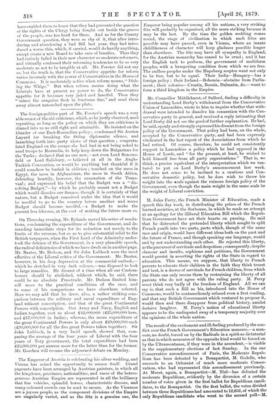The foreign-politics part of Mr. Forster's speech was a very
able recast of the old criticisms, which, as he justly observed, need repeating, as long as the policy on which they are criticisms is dinned into us as still right and attainable. He insisted on the blunder of our East-Roumelian policy ; condemned Sir Austen Layard for breaking the fitting diplomatic silence, and launching forth into party views of that question ; congratu- lated England on the escape she had had in not being asked to send troops to Roumelia, to help keep down the Bulgarians for the Turks ; declared that no one now,—not even Lord Beacons- field or Lord Salisbury, — believed at all in the Anglo- Turkish Convention, or would be anything but thankful if it could somehow be buried in oblivion ; touched on the mess in Egypt, the mess in Afghanistan, the mess in South Africa, defending heartily, however, the annexation of the Trans- vaal ; and expressed his belief that the Budget was a " dis- solving Budget,"—by which he probably meant not a Budget which would dissolve our finance, though it is certainly of that nature, but a Budget conceived under the idea that it would be needful to go to the country before another and worse Budget should become needful, —a Budget to make the present less irksome, at the cost of making the future more so.


































 Previous page
Previous page